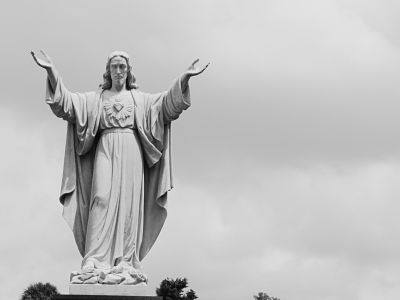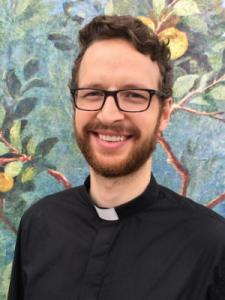
An Austrian Philosopher, a Polish Pope, and My Time at Ruah Woods
July 29, 2020
 A Tale of Two Views
A Tale of Two Views
When St. John Paul II was three years old, an Austrian non-Christian philosopher named Martin Buber published a book called I and Thou. In the book, Buber suggests that humans approach reality with one of two attitudes. We either see others—both things and people—as “Its”, or we see them as “Thous.” To explain the difference between the two, Buber considers a tree. One can look at a tree as if looking at a picture, noticing its shape and colors; one can study it and classify it in a species; one can perceive its movements, its growth, its deepening roots, and its sway in the wind. In doing so, Buber tells us:
“The tree remains my object, occupies space and time, and has its nature and constitution.”
Approached in this way, the tree is a thing. In fact, it’s a thing among things. It’s one of many. It’s, moreover, usable for any number of ends (for example, to shade a patio or decorate a yard). It is, therefore, a means. Approaching the tree in this way, I am seeing it as an It. Buber continues:
“It can, however, also come about, if I have both will and grace, that in considering the tree I become bound up in relation to it. The tree is now no longer It. I have been seized by the power of exclusiveness.”
Put differently, the tree can cease to be something I study or observe. It can cease to be something I seek to experience or use. Rather, Buber proposes, in a moment involving both, “will,” and what Buber calls, “grace,” it can happen that the wholeness of the tree can become fully present to me as something I stand in a unique relation with. As such, the tree has become my Thou.
“Wholly See”
This may seem a little abstract or even kind of strange, but Buber’s concept of the Thou positively comes to light when he considers humans. Buber writes:
“If I face a human being as my Thou, and say the primary word I-Thou to him, he is not a thing among things, and does not consist of things. This human being is not He or She, bounded from every other He and She, a specific point in space and time within the net of the world; nor is he a nature able to be experienced and described, a loose bundle of named qualities. But with no neighbor, and whole in himself, he is Thou and fills the heavens.”
Thus, when we approach another as a Thou, we see them not as an object but as a whole person to whom we are fully present and fully given. There is no intention of use in such a relation. The other’s fullness is encountered and I am completely drawn in. They have become, in this way, my Thou.
 Love is the Only Response
Love is the Only Response
Seventy-one years after the publication of I and Thou, Pope John Paul II, in his book Crossing the Threshold of Hope, expresses his gratitude towards Martin Buber for having furthered a personalistic philosophy that emphasizes the value of human persons and the meaningfulness of being in relationship with others. This personalism permeates the writings of St. John Paul II. For instance, in Love and Responsibility, the Saint establishes what he calls the personalistic norm:
“The person is the kind of good which does not admit of use and cannot be treated as an object of use and as such the means to an end. … the person is a good towards which the only proper and adequate attitude is love.”
Along with describing this personalistic viewpoint in his writings, St. John Paul II also lived this attitude. He sought to see others as a Thou, as persons to whom he could be fully  present and fully given. I’ve heard it said that you could be in a room with St. John Paul II with countless others and yet if he was in conversation with you, he would make you feel as though you were the only one in the room. When I traveled to Poland in 2016 for World Youth Day, I visited St. John Paul II’s childhood home which is now a museum containing many remarkable artifacts from his life. One display within the home contains pictures and testimonies from the camping trips that the young Fr. Wojtyla took with students and friends. In one of the testimonies, one camper described how Fr. Wojtyla would, one-by-one, invite each camper out in a canoe on the lake to talk with and get to know. It was a moment of great joy to be chosen to spend this time with Fr. Wojtyla. This young camper recounted how Fr. Wojtyla would put all the attention on you, asking you questions and making you feel as though you were the most important subject to him.
present and fully given. I’ve heard it said that you could be in a room with St. John Paul II with countless others and yet if he was in conversation with you, he would make you feel as though you were the only one in the room. When I traveled to Poland in 2016 for World Youth Day, I visited St. John Paul II’s childhood home which is now a museum containing many remarkable artifacts from his life. One display within the home contains pictures and testimonies from the camping trips that the young Fr. Wojtyla took with students and friends. In one of the testimonies, one camper described how Fr. Wojtyla would, one-by-one, invite each camper out in a canoe on the lake to talk with and get to know. It was a moment of great joy to be chosen to spend this time with Fr. Wojtyla. This young camper recounted how Fr. Wojtyla would put all the attention on you, asking you questions and making you feel as though you were the most important subject to him.
 Gift-of-Self, Gift-of-Time
Gift-of-Self, Gift-of-Time
I share all of this because, as I reflect on my time as a seminarian intern, here at Ruah Woods this summer, I discover this overarching theme: to recognize the immense value of each interaction. I’ve been privileged to help Ruah Woods in several capacities; assisting in the promotion of the Called to be More High School Theology of the Body Curriculum, contributing to social media endeavors, attending staff meetings, organizing campus chapel Masses, and replacing the tank on the water cooler a time or two. But the most meaningful keepsake from my internship has been the many treasured conversations and interactions I’ve had with my coworkers, now friends. In discussions over lunch and in passing, I’ve learned about their lives, struggles, and hopes. Some exchanges were short, some long. Each interaction had value, and I’m grateful for the time each of my coworkers granted me.
I can’t say that I always succeeded in seeing my coworkers as a Thou, as individuals worthy of my complete attention, as persons to whom I may be fully present and fully given.  Sometimes it’s difficult to recognize the sacredness of such interactions. Indeed, we move a great deal. We move both exteriorly and interiorly. Part of the challenge is learning how to stay still in order to recognize the infinite value of the moment with another, even if the conversation seems somewhat trivial or spur of the moment.
Sometimes it’s difficult to recognize the sacredness of such interactions. Indeed, we move a great deal. We move both exteriorly and interiorly. Part of the challenge is learning how to stay still in order to recognize the infinite value of the moment with another, even if the conversation seems somewhat trivial or spur of the moment.
St. John Paul II has gifted us with a compelling example of what it means to see another as a Thou. Moreover, I am convinced that such an attitude towards other human persons, because of its frequent absence in our culture, has the sincere capacity to help renew a broken society.
St. John Paul II, pray for us, that we might see the inestimable value and dignity in those we come into contact with each and every day; and we pray that all people will experience the boundless love of God whose care for us is without measure. Amen.

Written by,
Jeff Stephens, Ruah Woods Summer Seminarian Intern
Share